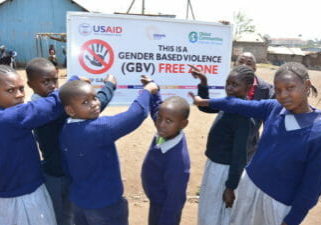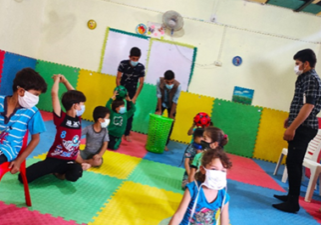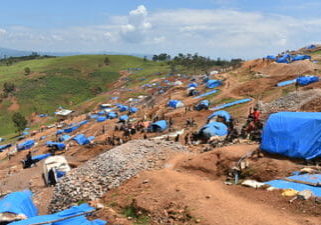News > Blog
Vasylkivska Consolidated Community Improves Access to Quality Drinking Water in Educational Establishments
Published 11/17/2021 by globalcommunities

Many of the 56 individual communities in Ukraine’s Vasylkivska Consolidated Community, Dnipropetrovsk Oblast lacked access to clean water. The population of about 23,000 had only one village acting as the central water supply with the communal entity of Dzherelo (meaning “wellspring”) administering water supply services, making it challenging to widely distribute clean water across other Consolidated Community settlements.
Community members identified the provision of quality drinking water in local schools and kindergartens as critical since the lack of access also caused an increase of diseases among children, provoking infection and problems with joints. Also problematic was that water existing in the educational institutions did not meet the State’s sanitation regulations.
“The Education Department faced the same problem yearly – how to provide schools and kindergartens in the community with quality drinking water,” said Oleg Progonnyi, Head of Education, Culture, Youth and Sports Department of the executive body at Vasylkivka settlement council. “Apart from that, the timing of the water delivery to the institutions was significantly impacted by the weather conditions, especially during winter time.”
With support from the USAID-funded “Decentralization Offering Better Results and Efficiency” (DOBRE) program, the Consolidated Community implemented a project to install water purification systems at 11 training institutions and six pre-school facilities in Vasylkivska, including 17 water tanks. The installations were subsidized by budget resources that were allocated by community leaders. Additionally, the community set up fountains at schools with drinking water and pumps for transferring purified water from the tanks. More detailed information is available on the community’s website.
Representatives of the Vasylkivka Inter-Rayon Department for Laboratory Research — an institution under the Ministry of Healthcare of Ukraine — analyzed the quality of the purified drinking water in the educational facilities and found that the samples met the hygiene requirements for the water for human consumption issued by the Ministry of Healthcare of Ukraine.
“As the head of the training complex number two in Vasylkivka, I have come across the same situation: where to take water from, how to store it and will there be enough until the next delivery? This project, implemented with DOBRE’s support, allows us to have the systems needed to purify water. The water fountains give children access to drinking water when they need it,” said Maksym Honcharenko, head of one of the schools that is participating in the program.
In Vasylkivska Consolidated Community, drinking water quality has significantly improved in 11 schools with more than 2,000 students and 500 teachers and six pre-school facilities with 528 children and 133 specialists.
“When the fountain with the drinking water appeared at our school, I stopped thinking whether I forgot to put a water bottle for school into my son’s backpack,” said Tetyana, mother of a 1B grade student at a training complex in Vasylkivka settlement.
As a result of savings from the water purification systems that DOBRE assisted in purchasing and the community installed, budget expenses have decreased by 49,900 Ukrainian hryvnia ($1,820) by removing the need for water deliveries to schools and kindergartens. The Consolidated Community reallocated these savings to purchase equipment for schools in Vasylkivka settlement, in the villages of Manvelivka and Velykooleksandrivska, including a multimedia projector for the school in Hryhorivka village.
Oleg Progonnyi, coordinator of the project, sums up the positive impact on the community this way: “Thanks to the installed filters for the final purification of water, we received the quality drinking water, which does not require cooling or boiling prior to its consumption. With this, we have provided the quality drinking water supply at educational institutions, which helps decrease the sickness rate among our children.”






